Table of Contents
- What is Resveratrol
- Benefits of Resveratrol for Longevity
- Potential Side Effects of Resveratrol
- Different Types of Resveratrol Supplements and Which is Best?
- Recommended Dosage of Resveratrol
- Understanding the Bioavailability of Resveratrol and How to Give it a Boost
- How much Does Resveratrol Cost
- How to Store Resveratrol
- What are the Best Resveratrol Supplement Brands
- How I Created this Guide and Thanks for Reading
- References
Resveratrol, a health and wellness compound, has been around since 2003 [ 1 ] when a study (by a team that included ) of the first studies conducted included Dr. David Sinclair. Since then, its popularity and credibility have gone on a rollercoaster as other research and studies have contradicted each other regarding its effectiveness.
This article will focus on it as a longevity supplement (not for skin care) and draw on my experience as an experienced consumer, biohacker, and personal researcher of longevity supplements. I will reference my experiences and relevant research to help you decide whether or not it’s right for you and what you should be aware of when purchasing and using.
What is Resveratrol
Resveratrol is known as a polyphenol found naturally in many different plants, with some of the highest concentrations found in Grapes (grape skin), grape juice, peanuts, cocoa, berries, cranberries, and Japanese Knotweed [ 2 ].
Polyphenols, in general, are antioxidant-like compounds, and while they can be obtained naturally in your diet from the above sources, the average adult consumes up to 8mg per day [ 3 ]; some longevity researchers and experts believe this amount is inadequate, and recommend boosting daily intake by supplementation, which I will outline later in this guide.
Benefits of Resveratrol for Longevity
The potential benefits of Resveratrol on human health and longevity are extended, with many of these potential benefits coming from its antioxidant effects on the human body, in addition to it being a SIRT 1 activator (one of the longevity pathways).
Some of its potential benefits to health span include:
- Anti-inflammatory effects: Resveratrol may help to reduce inflammation in the body, which is associated with a range of chronic diseases, including heart disease, diabetes, and cancer.
- Improved cardiovascular health: Resveratrol may help improve cardiovascular health by reducing blood pressure, blood lipid levels, and blood clot risk.
- Improved insulin sensitivity: Resveratrol has been shown to improve insulin sensitivity in some studies, which could help to reduce the risk of type 2 diabetes.
- Increased longevity: Some studies have suggested that Resveratrol may increase lifespan in specific animal models, although more research is needed to confirm these findings in humans.
- Neuroprotective effects: Resveratrol has been shown to have neuroprotective effects, which could potentially help to reduce the risk of age-related cognitive decline and neurodegenerative diseases such as Alzheimer’s disease.
It’s important to note that the research on Resveratrol is ongoing, and there is some debate from leading health and longevity researchers on its effectiveness.
While these potential benefits are great, this supplement goes hand in hand with NMN; studies [ 4 ] have found that the effectiveness of Resveratrol increases significantly when taken with NMN (Nicotinamide mononucleotide). Therefore, if you plan to take Resveratrol, you should consider taking it alongside NMN.
Potential Side Effects of Resveratrol
As with any supplement, Resveratrol has side effects; however, research shows that it is in the long-term daily dosages over 2.5 g can have the following side effects nausea, vomiting, diarrhea, and liver dysfunction in people with non-alcoholic fatty liver disease.
Another common side effect is that it has been shown to slow down clotting; as someone that has been taking Resveratrol since early 2020, this is something that I have personally experienced; after I started taking Resveratrol, cuts now takes longer to stop bleeding, so it’s essential that if you do take Resveratrol, you discuss with your doctor especially if you are scheduled for surgery, discuss with your doctor how long before surgery you should stop taking it, on the same point seek advice from your doctor if you are taking anti-clotting medication.
Different Types of Resveratrol Supplements and Which is Best?
There are two primary forms (isomeric) of Resveratrol that are found in the supplement world, these being CIS and Trans-resveratrol. However, the trans form is more bioavailable; therefore, any potential benefit should be more significant.
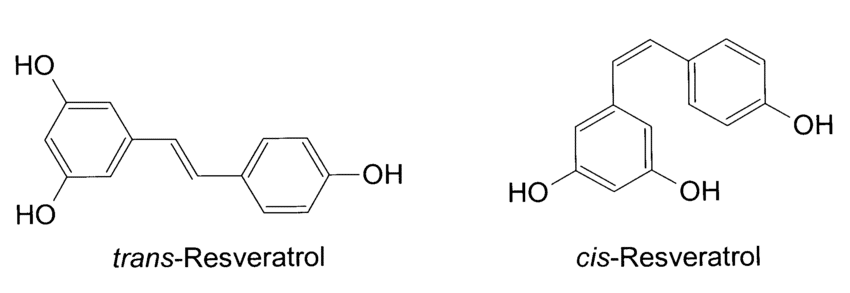
It’s important to note that many supplement companies are not very upfront with the form they are supplying you; many are a 50-50 mix of trans to cis Resveratrol, some are 100% cis, and the good ones are 100% trans. I have found that the companies supplying cis or a mix of cis and trans are labeled as Resveratrol, whereas ones with 100% resveratrol will be marked as trans-resveratrol. Just see some of the labels below.
Tips to ensure you are purchasing or have purchased trans-resveratrol:
- First, check the front and back label to ensure it specially states trans-resveratrol
- Check the supplement brands’ websites or send them an email inquiry.
- Finally, check the color of the powder; see my picture below.
In Dr David Sinclairs’ book Lifespan Why we Age and why we don’t have to, he mentions says that trans resveratrol powder should be white, whereas cis Resveratrol is brown.
As I have been taking Resveratrol since early 2020, I have purchased and taken many different brands, so I have a comparison to show you below; on the left is trans-resveratrol, and on the right is cis or a mixture of cis and trans-resveratrol, notice the whiter color of trans compared to the browner cis form. I have seen some supplements with a much darker brown color.
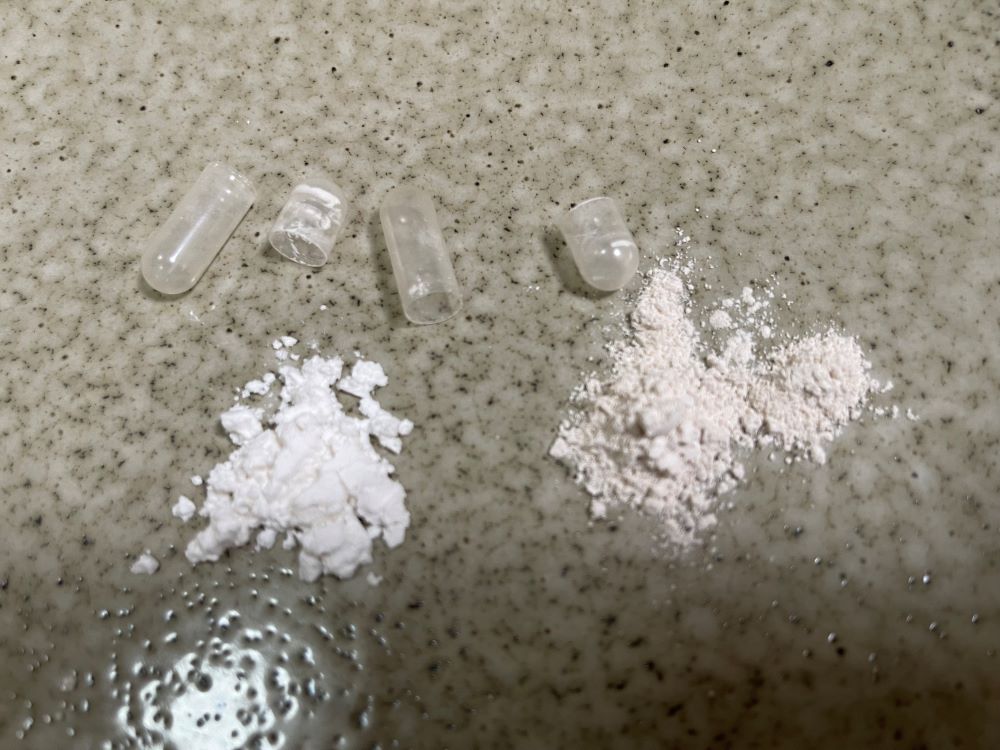
Unfortunately, you can only identify after you have purchased unless someone posts photos in a review.
Recommended Dosage of Resveratrol
Many researchers recommend a daily dosage of Resveratrol between 250 mg and 1,000 mg; David Sinclair’s daily dosage is in the upper range at 1,000 mg, you can read more about his supplement stack, and I take 1,000 mg per day; however, just like David Sinclair, I monitor my blood work regularly and started at a lower dosage before slowing increasing to this large dose.
As with all my supplements, I periodically take a break and inform my doctor of the complete list.
I recommend discussing dosages with your doctor or healthcare provider to determine a suitable dose and dosing strategy.
PS you can read my full supplement stack here.
Understanding the Bioavailability of Resveratrol and How to Give it a Boost
Unfortunately, Resveratrol is not very bioavailable; most of it is destroyed in the gut before it can get absorbed into the bloodstream; what I and many biohackers do, which was initially shared by David Sinclair, is mix Resveratrol with a fatty food source such as yogurt, olive or MCT oil, many biohackers like to mix with olive oil as its already a very potent SIRT 1 activator.
Below is my mixture of Resveratrol with yogurt I take in the morning.
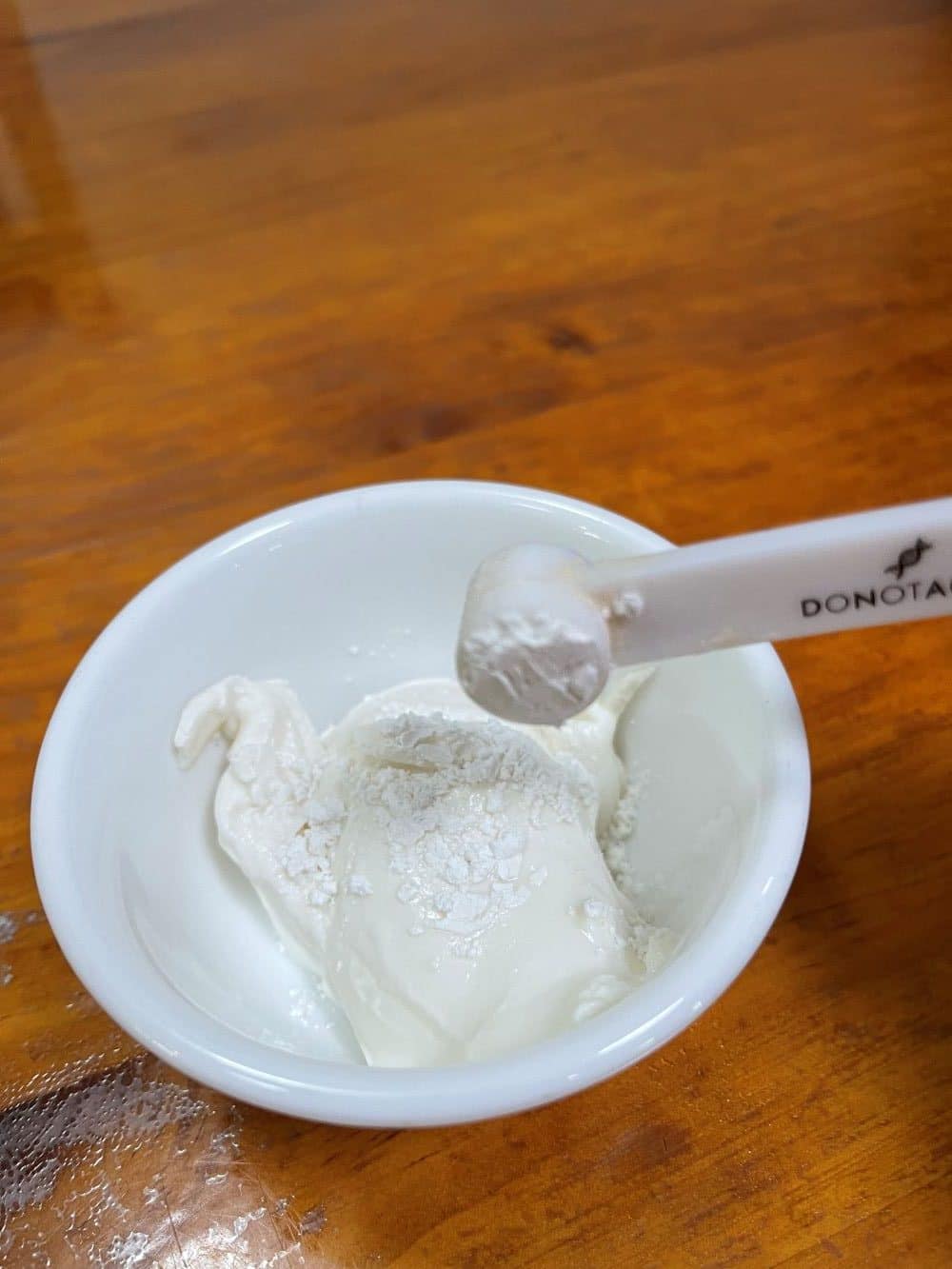
How much Does Resveratrol Cost
Resveratrol is a reasonably inexpensive supplement compared to NMN, SIRT6 activators, and other longevity supplements. It is reasonably cheap to produce; leading brands cost around $0.60 per 500 mg capsule with further discounts if purchased in powder form, using a coupon code or on a multi-order subscription.
How to Store Resveratrol
Resveratrol should be stored in a cold, dry, and dark environment, which is why I keep my Resveratrol in the refrigerator; if you have purchased a bulk amount, for instance, more than 100 g, I would recommend decanting into a small container for the month, this will prevent excessive condensation build up in your bulk container when it’s taken out and back into the refrigerator daily.
What are the Best Resveratrol Supplement Brands
There are many resveratrol supplement brands on the market, so trying to find the best can be challenging; in addition, an ideal brand that is good for one person may not be suitable for someone else as there are many different factors to consider; I will outline what I believe the factors you should consider when choosing the best resveratrol supplement brands and then go into some of the brands I recommend.
My Tips for Choosing the Right Resveratrol Supplement
- Ensure it is Trans-resveratrol; check the label or my tips above.
- Recommended dose vs. supplement weight per capsule; some brands are a bit deceptive with this. They say state recommended dose on the front label and don’t mention the capsule weight anywhere except on the back label, so you think you are getting capsules of, say, 500 mg, whereas this is the recommended dose, look on the back label for wording like serving size more than 1 capsule.
- At a minimum, ensure the supplement is produced to GMP and ISO9001 manufacturing standards.
- If necessary to you, ensure its non-GMO, Soy Free, Vegan, and Gluten free
- Check the supplement brand website for a recent Certificate of Analysis (COA) from a recognized laboratory such as Micro Quality Labs, Summit Nutritional Laboratories, or Eurofins.
- Has the supplement brand been in business for more than 2 years
- Do they have a satisfaction money-back guarantee
- Cost, for supplements that have ticked all of the above boxes, compare pricing to ensure you are purchasing at a competitive price.
- Is free shipping provided
- Stay away from brands that only sell on Amazon or eBay. See why here
Brands that I recommend
Here is a list of supplement brands that I am either using at the moment or have purchased in the past, have had experience with, and trust each of them ticking all of the above boxes.
DoNotAge Resveratrol
Existing readers of Longevity FAQ will know that DoNotAge is one of my longevity supplement brands of choice; they tick all of the boxes above and sell both capsules and powder with the following SKUs/options available:
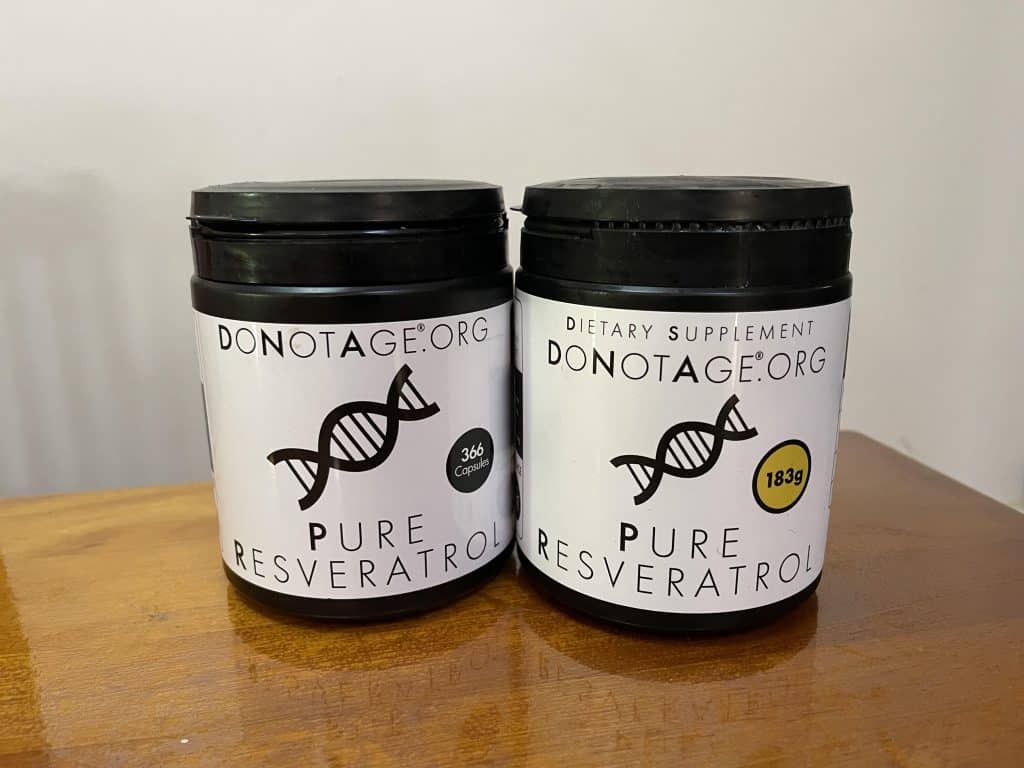
Capsule
60 x 500 mg Capsules (1 month supply if taking 1,000 mg per day)
366 x 500 mg Capsule (6 months’ supply if taking 1,000 mg per day)
Powder
100 g Powder (100 days supply if taking 1,000 mg per day)
183 g powder (6 months supply if taking 1,000 mg per day)
Both powder SKUs have a 500 mg scoop to measure your desired dose.
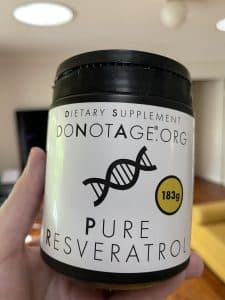
Their prices are cheap, and even cheaper if signing up for an annual subscription, also by using coupon code: LONGEVITYFAQ you will save an additional 10%. Note I will receive a small commission if this code is used; however, it will not cost you anything; you will be supporting this website and our Facebook group so that more high-quality, informative articles just like this one can be created.
ProHealth Longevity
Another great Resveratrol supplement brand is ProHealth Longevity. I have used them in the past, and they follow all the best practices and tick all the boxes above that I outlined on selecting a good resveratrol supplement. ProHealth Longevity sells trans-resveratrol in both capsule and powder form and also sells some larger bulk options for powder up to 1 Kg in weight, which would be enough for 1,000 days supply if taking 1,000 mg per day. This bulk option would suit a large family or friends that would like to save money by sharing the cost of a bulk pack.
Other than Resveratrol ProHealth, Longevity sells NMN supplements that support NAD+ production, including bulk NMN supplements, Sirtuin activators, and nootropics and brain health supplements.
Capsule
60 x 500 mg Capsules (1 month supply if taking 1,000 mg per day)
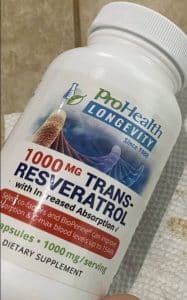
Powder
Bulk Micronized Trans-Resveratrol
30 g Powder (1 month supply if taking 1,000 mg per day)
100 g Powder (100 days supply if taking 1,000 mg per day)
250 g Powder (250 days supply if taking 1,000 mg per day)
500 g Powder (500 days supply if taking 1,000 mg per day)
1 kg (5000 g) Powder (1000 days supply if taking 1,000 mg per day)
RENUE by Science
RENUE by Science is another high-quality longevity supplement brand that sells trans-resveratrol; as with the other brands listed, they tick all the boxes in my checklist for a good quality resveratrol supplement brand. What I like about RENUE is that they have some innovative resveratrol products, including a liposomal version, which they say is more bioavailable and, therefore, you should not require as much.
Looking at their resveratrol SKUs, they have the following:
Liposomal trans-resveratrol Capsules 90
As this is a liposomal version of the product, which RENUE by Science says you only need 1 x 125 mg capsule of daily, therefore this container should last 90 days (approx. three months)
Pure Trans-resveratrol Powder 100 g (100 days supply if taking 1,000 mg per day) RENUE recommends taking one level scoop twice daily.
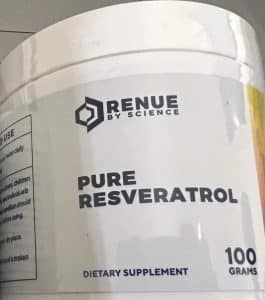
ENERGIZER AM – Liposomal Glutathione, Resveratrol, CoQ10, Apigenin
This innovative product, in addition to liposomal Resveratrol, includes liposomal Glutathione, Liposomal CoQ10, and Liposomal Apigenin. They say it is a powerful combination of anti-aging molecules formulated to increase NAD+ levels.
How I Created this Guide and Thanks for Reading
Thanks for taking the time to read this guide; as with all guides on this site, the information is based on my personal experiences, self-hacking and extensive reading I have done in this area on Resveratrol and longevity in general. I welcome all comments on this article (both good and bad) and questions on this topic, please leave your comment below, and I will help answer.
References
- Howitz, K., Bitterman, K., Cohen, H. et al. Small molecule activators of sirtuins extend Saccharomyces cerevisiae lifespan. Nature 425, 191–196 (2003). https://doi.org/10.1038/nature01960
- Chachay, V. S., Kirkpatrick, C. M., Hickman, I. J., Ferguson, M., Prins, J. B., & Martin, J. H. (2011). Resveratrol–pills to replace a healthy diet?. British journal of clinical pharmacology, 72(1), 27–38. https://doi.org/10.1111/j.1365-2125.2011.03966.x
- Gambini, J., Inglés, M., Olaso, G., Lopez-Grueso, R., Bonet-Costa, V., Gimeno-Mallench, L., Mas-Bargues, C., Abdelaziz, K. M., Gomez-Cabrera, M. C., Vina, J., & Borras, C. (2015). Properties of Resveratrol: In Vitro and In Vivo Studies about Metabolism, Bioavailability, and Biological Effects in Animal Models and Humans. Oxidative medicine and cellular longevity, 2015, 837042. https://doi.org/10.1155/2015/837042
- Bai, L. B., Yau, L. F., Tong, T. T., Chan, W. H., Zhang, W., & Jiang, Z. H. (2022). Improvement of tissue-specific distribution and biotransformation potential of nicotinamide mononucleotide in combination with ginsenosides or Resveratrol. Pharmacology research & perspectives, 10(4), e00986. https://doi.org/10.1002/prp2.986
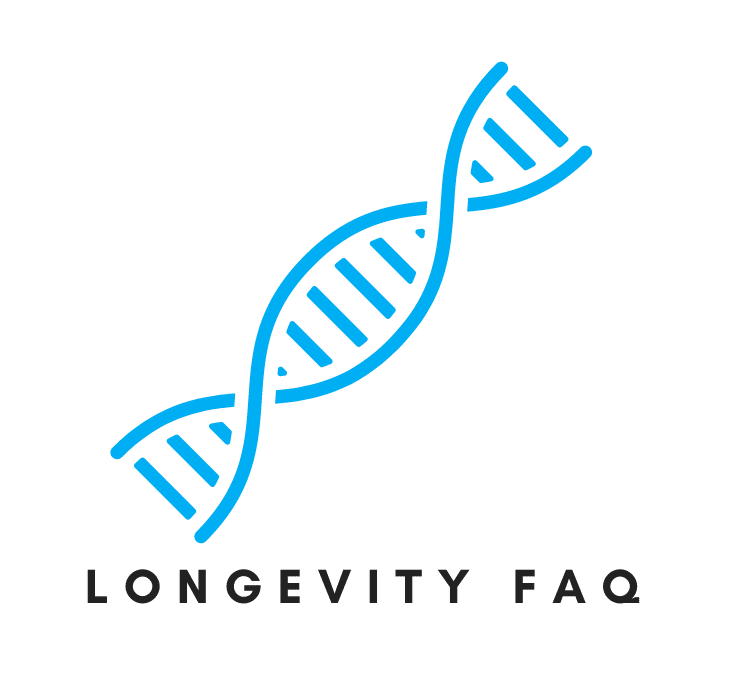
Hi Ben, I was enthused about starting regimen of supplements until I read that person with fatty liver disease should not take resveratrol. I am crushed. Is this a hard and fast rule or could I take a lower dose to see how my body reacts before slowly increasing the dosage?
Hi Mike
From the research I have read there can be side effects for larger dosages (more than 2.5 g), Note there is research that shows resveratrol coiuld be a “potential treatment option for the management of non-alcoholic fatty liver disease (NAFLD) due to its anti-inflammatory, antioxidant, and calorie-restricting effects.”
Most people take less than 1 g a day so its al lot less than the 2.5 g a day in which the research showed side effects, so if it was me I would start low and work up and monitor for side effects.
See research below: